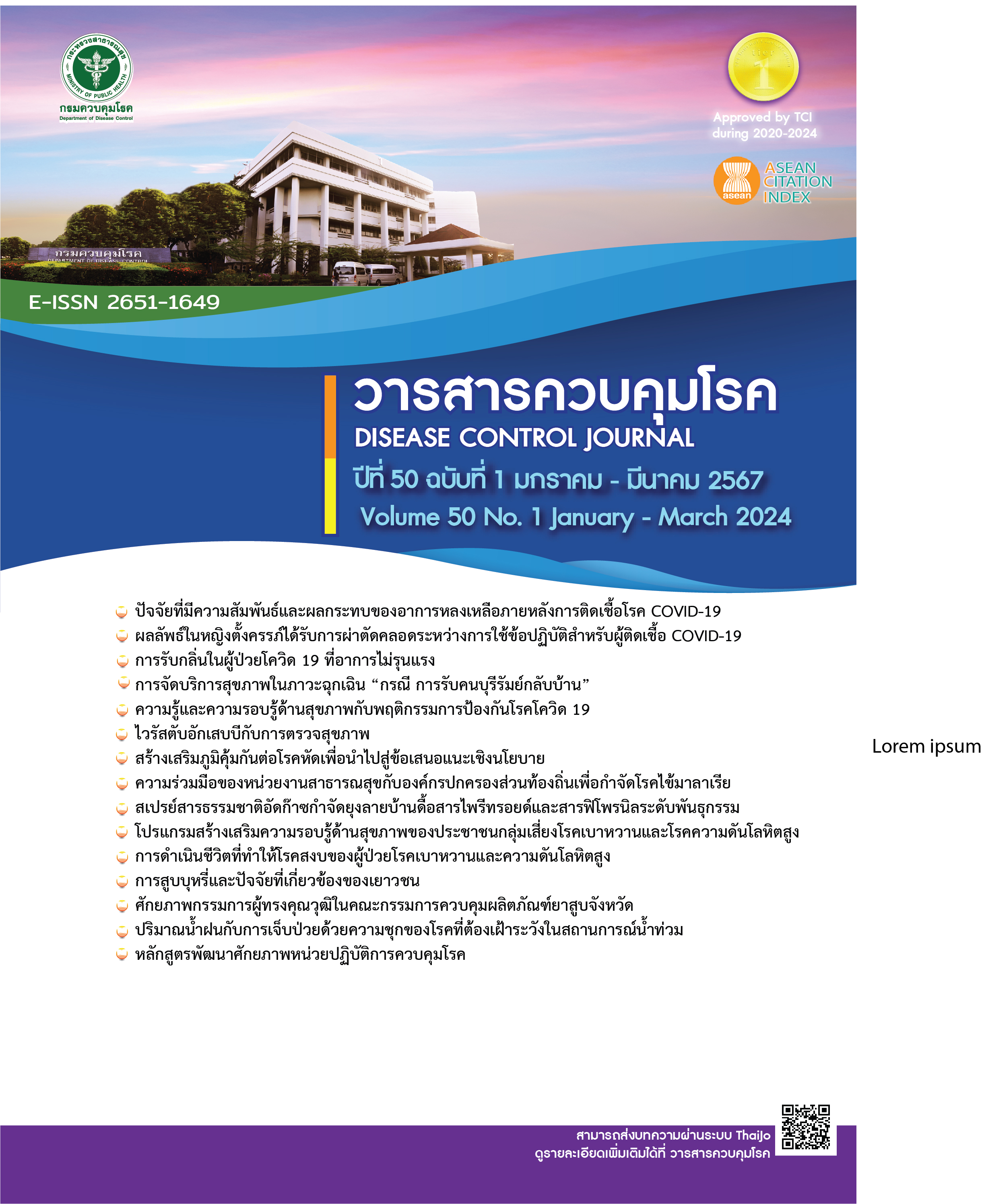Effects of the health literacy program of people at risk of diabetes and hypertension in Nakhon Sawan Province
DOI:
https://doi.org/10.14456/dcj.2024.10Keywords:
risk group of diabetes, risk group of hypertension, health literacyAbstract
Diabetes and hypertension are non-communicable chronic diseases (NCDs) which are important health problems at both national and global levels. The main causes are improper dietary habits, sleeping late, not exercising, having high stress, drinking alcohol and smoking. These behaviors can be changed if people have health literacy. Health literacy is an important factor in taking care of individuals’ health which affects behavior and health outcomes. A one-group pretest-posttest quasi-experiment was conducted to examine the effects of the health literacy program for people at risk of diabetes and hypertension on their health literacy and behavioral changes in Nakhon Sawan province. Total of 30 participants, age 30-75 years, who were at risk of diabetes and hypertension at Koei Chai health promoting hospital, Chum Saeng district, Nakhon Sawan province in 2022 were recruited into the study. Findings revealed a significantly higher mean score of health literacy and preventive behaviors regarding diabetes and high blood pressure after participated to the program than that before (p-values<0.001). Therefore, public health agencies at all levels should support and promote health literacy programs regarding diabetes and hypertension in all components, for the risk groups. Good health literacy among risk groups will lead to the prevention of new cases of diabetes and hypertension.
Downloads
References
Department of Disease Control (TH), Bureau of Non-communicable Diseases. Strategy to reduce salt and sodium consumption in Thailand 2016-2025. Bangkok: Office of Printing Affairs, War Veterans Organization under royal patronage; 2016. (in Thai)
International Diabetes Federation. IDF Diabetes Atlas [Internet]. 2017 [cited 2022 Jun 18]. Available from: https://diabetesatlas.org/
World Health Organization (WHO). A global brief on hypertension: silent killer, global public health crisis: World Health Day 2013 [Internet] 2013. [cited 2022 Jun 18]. Available from: https://www.who.int/publications/i/item/a-global-brief-on-hypertension-silent-killer-global-public-health-crisis-world-health-day-2013
Health Data Center (HDC). Service plan data report, Non-communicable Diseases branch [Internet] 2022. [cited 2022 Jun 22]. Available from: https://hdcservice.moph.go.th/hdc/reports/page.php?cat_id=b2b59e64c4e6c92d4b1ec16a599d882b (in Thai)
World Health Organization. Health promotion glossary. Geneva: Marilyn Langfeld; 1998.
Kaeodumkoeng K. Health literacy: access, understand and appilcation. 2nd ed. Bangkok: Mahidol University; 2018. (in Thai)
Kaeodumkoeng K. Health literacy: functional, interactive and critical. Bangkok: Amarin printing and publishing public company limited; 2019. (in Thai)
Cochran WG. Sampling Techniques. 2nd ed. New York: John Wiley and Son; 1963.
Norasing M, Thanomphan S. Health literacy and health behavior in patients with uncontrolled blood sugar level or blood pressure: a case study of Nakornping Hospital, Chiang Mai. Journal of Nakornping Hospital. 2019;10(1):35-50. (in Thai)
Likert R. The method of constructing and attitude scale. In: Fishbein M, editor. Readings in Attitude Theory and Measurement. New York: John Wiley & Sons; 1967. P.90-5.
Bloom S. Human characteristics and school learning. New York: McGraw-Hill; 1976.
Nutbeam D. Health literacy as a public health goal: a challenge for contemporary health education and communication strategies into the 21st century. Health promotion international. 2000;15:259-67.
Department of Health Service Support (TH), Health Education Division. Promoting and evaluating health literacy and health behavior. Nonthaburi: Department of Health Service Support; 2018. (in Thai)
Pantong U, Kajornwattanakul P. Effects of an empowerment program on selfcare behaviors, HbA1c and clinical outcomes in uncontrolled type 2 diabetes patients. Nursing Journal of the Ministry of Public Health. 2020;30(1):14-24. (in Thai)
Suwannasri J, Iemsawasdikul W, Potisupsuk C. Effects of a self-care behavior development
program for Diabetes Mellitus patients at Kut Chum district, Yasothon province. Thai Journal of Nursing. 2020;69(4):40-9. (in Thai)
Choeisuwan V. Health Literacy: Concept and Application for Nursing Practice. Royal Thai Navy Medical Journal. 2017;44(3):183-97. (in Thai)
Roma W, Mukda S, Kloiiam S. Survey project health literacy of Thai people aged 15 years and over, year 2017 (Phase1) [Internet]. Department of Health, Ministry of Public Health; 2017 [cited 2021 Jul 28]. Available from: https://kb.hsri.or.th/dspace/handle/11228/5216 (in Thai)
Saentecha P, Saentecha P. The Effectiveness of a Program for Health Literacy Development in the Patients with Type 2 Diabetes. Thai Journal of Health Education. 2020;43(2):150-64. (in Thai)
Kongthaworn K. Effectiveness of an empowerment program to reduce the risk of developing high blood pressure. in the at-risk group of people in Nong Takhong Subdistrict, Pong Nam Ron District Chanthaburi Province [Internet]. 2019. [cited 2022 Aug 18]. Available from: http://pongnamron.thaiddns.com:10838/doc/wichakan/Research/Research_2562HTPongnamron.pdf (in Thai)
Indhraratana A. Health literacy of health professionals. Journal of The Royal Thai Army Nurses. 2014;15(3):174-8. (in Thai)
Downloads
Published
How to Cite
Issue
Section
License
Copyright (c) 2024 Disease Control Journal

This work is licensed under a Creative Commons Attribution-NonCommercial-NoDerivatives 4.0 International License.
Articles published in the Disease Control Journal are considered as academic work, research or analysis of the personal opinion of the authors, not the opinion of the Thailand Department of Disease Control or editorial team. The authors must be responsible for their articles.






